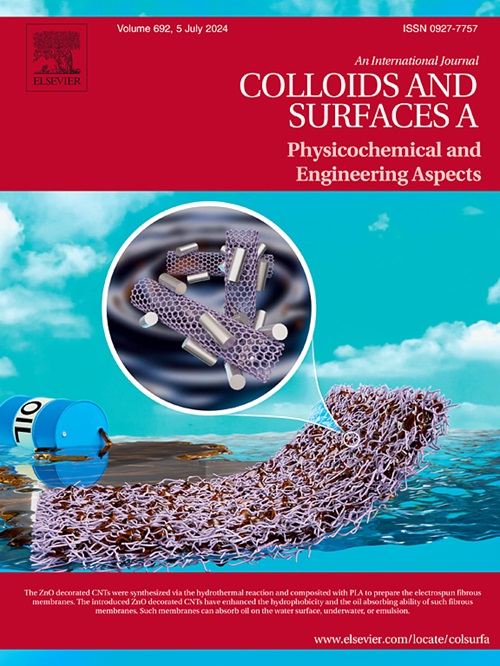Iron complexes synthesized from FeOCl with carboxylic acid based ligands as Fenton-like catalysts for the highly efficient degradation of organic dyes over a wide pH range
IF 4.9
2区 化学
Q2 CHEMISTRY, PHYSICAL
Colloids and Surfaces A: Physicochemical and Engineering Aspects
Pub Date : 2024-11-04
DOI:10.1016/j.colsurfa.2024.135697
引用次数: 0
Abstract
Iron-based materials have garnered significant attention as Fenton-like catalysts for the degradation of organic dyes. However, challenges remain in optimizing hydroxyl radical (•OH) utilization and broadening the effective pH range for practical applications. In this study, three iron-based catalysts (complex 1, 2, 3) were synthesized via a hydrothermal method, utilizing iron oxychloride (FeOCl) as the metal ion source and 4,5-imidazole dicarboxylic acid, furan-2,5-dicarboxylic acid, and 5-hydroxyisophthalic acid as ligands, respectively. The results indicate that these synthesized Fe-based catalysts exhibit enhanced visible light absorption and superior photo-Fenton activity, outperforming FeOCl in the degradation of rhodamine B (Rh-B), crystal violet (CV), and methylene blue (MB). Moreover, the Fe-based catalyst system operates effectively over a wide pH range (1–8) and efficiently degrades organic dyes. In free radical scavenging experiments, hydroxyl radicals (•OH) and superoxide radicals (•O2-) were identified as the primary agents responsible for photocatalytic degradation. Among the catalysts, complex 1 displayed notable stability, retaining its catalytic activity after three reuse cycles. This work presents a promising approach for designing highly efficient and stable Fenton-like catalysts, offering excellent environmental remediation capabilities across a broad pH range.
由含有羧酸配体的 FeOCl 合成的铁络合物作为类似芬顿的催化剂,可在较宽的 pH 值范围内高效降解有机染料
铁基材料作为降解有机染料的 Fenton 类催化剂,已经引起了广泛关注。然而,在优化羟基自由基(-OH)的利用和扩大实际应用的有效 pH 值范围方面仍然存在挑战。本研究以氧氯化铁(FeOCl)为金属离子源,分别以 4,5-咪唑二羧酸、呋喃-2,5-二羧酸和 5-羟基间苯二甲酸为配体,通过水热法合成了三种铁基催化剂(复合物 1、2、3)。结果表明,这些合成的铁基催化剂在降解罗丹明 B(Rh-B)、结晶紫(CV)和亚甲基蓝(MB)方面表现出更强的可见光吸收能力和更优越的光-芬顿活性,其性能优于 FeOCl。此外,该铁基催化剂系统可在较宽的 pH 值范围(1-8)内有效运行,并能高效降解有机染料。在自由基清除实验中,羟自由基(-OH)和超氧自由基(-O2-)被确定为光催化降解的主要物质。在这些催化剂中,复合物 1 显示出显著的稳定性,在重复使用三个周期后仍能保持其催化活性。这项工作为设计高效、稳定的 Fenton 类催化剂提供了一种前景广阔的方法,可在广泛的 pH 值范围内提供出色的环境修复能力。
本文章由计算机程序翻译,如有差异,请以英文原文为准。
求助全文
约1分钟内获得全文
求助全文
来源期刊
CiteScore
8.70
自引率
9.60%
发文量
2421
审稿时长
56 days
期刊介绍:
Colloids and Surfaces A: Physicochemical and Engineering Aspects is an international journal devoted to the science underlying applications of colloids and interfacial phenomena.
The journal aims at publishing high quality research papers featuring new materials or new insights into the role of colloid and interface science in (for example) food, energy, minerals processing, pharmaceuticals or the environment.

 求助内容:
求助内容: 应助结果提醒方式:
应助结果提醒方式:


